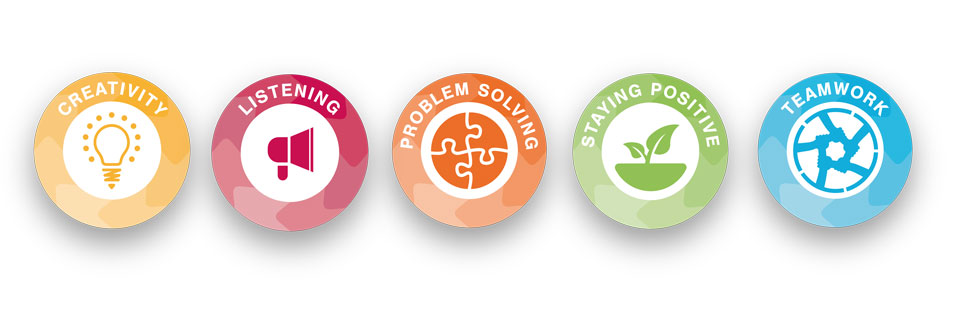Whilst there is a common acceptance of the importance of academic aptitude when it comes to life chances, it is by no means the only kind of ability that can have an impact. Emotional Intelligence – that is, the ability to understand and manage our own emotions and understand the emotions of others – which is an ability quite completely distinct and unconnected to academic ability, also plays a large part.
Given its distinction from intellectual ability, there is nothing to say that a child with high learning potential will necessarily also score highly in emotional intelligence. There are, however, many ways to support the development of the skills that make up emotional intelligence, so that a child can benefit from the positive impact on success and wellbeing that it can provide.
What Exactly is Emotional Intelligence?
Much research has been conducted into emotional intelligence, but psychologist Dr Daniel Goleman’s work is amongst the most well-known. He identified five key skills that constitute emotional intelligence:
- Self-awareness: the ability to recognise your own emotions (and how they affect not just yourself but others around you).
- Self-regulation: the ability to remain in control of your actions, whatever emotions you may be feeling.
- Motivation: the ability to persevere in your pursuits, even in the face of difficulties.
- Empathy: the ability to understand and respond to the emotions of others.
- Social skills: the ability to use emotional intelligence in the context of interpersonal relationships.
Why is it Important?
There are many areas in which the development of emotional intelligence can have a positive impact. Some of the potential benefits include:
- Reduction in stress and anxiety; positive impact on wellbeing, happiness and satisfaction with life
- The ability to make and maintain positive relationships
- Performance in school
- Competence in the workplace
- The development of leadership skills.
Emotional Intelligence and High Learning Potential
The skills required for emotional intelligence are, of course, beneficial to all. However, it may very often be the case that high learning potential children find the development of emotional intelligence of great use for reasons that are specific to their high learning potential.
A child experiencing some of the less helpful characteristics common in high learning potential children, such as the tendency towards perfectionism, or worry and anxiety, could benefit greatly from the mitigating effect of the development of their emotional intelligence. Similarly, these skills may help a high learning potential child through the potentially choppy waters of school and friendships, where their difference may lead to particular misunderstandings, frustrations or social challenges. It may, however, also be the case that their high learning potential creates a barrier to the development of that emotional intelligence, due to their asynchronous development, or the presence of one or more overexcitabilities.
Whatever their starting point, however, there is much that can be done to support young people in building on their skills in this area. As parents, support is best provided by first understanding the challenges your child might be facing, both in terms of the development of their emotional intelligence and the situations where the application of those skills might really help. From there, support can be provided to allow them, at their own pace, and in their own way, to begin to enjoy the benefits to their wellbeing that even the smallest of improvements in their emotional intelligence may bring.
Overexcitabilities
The benefit of emotional intelligence is particularly pronounced in the area of high learning potential overexcitabilities, especially, but by no means exclusively, that of emotional and intellectual overexcitability (see advice sheets PA614 Emotional Hypersensitivity (Emotional Overexcitability) and PA612 Enthused about Learning (Intellectual Overexcitability)).
For a child with emotional overexcitability, who experiences life more intensely than many and who experiences extremes of emotion (both positive and negative in flavour), it may well be that the development of the skills required for emotional intelligence, and of self-regulation skills in particular, would be especially salutary. It may also be the case, however, that their intensity makes these skills all the more difficult to acquire: the more extreme the emotion, the more difficult it may be to rein it in and feel in control of it.
A child with intellectual overexcitability may find that the development of their emotional intelligence can be of great help in mitigating the effect of the stresses, worries and inability to switch off that can often come with such an overexcitability. Indeed, with all of the overexcitabilities, emotional intelligence can be an important ally. It can help a child to build up an awareness of the triggers to their negative emotions, a set of positive responses, and to generally feel more in control. Such agency can have hugely positive effects on their wellbeing and self-esteem.
It may also be that there is the need for the slightly unusual approach of actually working to lessen their emotional intelligence in some areas. A child, for instance, who is empathetic to such a degree that any news of suffering, be it human, animal or planetary, pains them greatly, and who is overly tuned in to others’ emotions, may find their wellbeing best served by working to dial down the empathy, not develop it further.
Asynchronous Development
Asynchronous development, where a child’s intellectual ability in one or more areas has shot ahead of their development in other areas, can significantly muddy the waters when it comes to emotional intelligence. In many cases, it can make a child’s emotional literacy appear to be delayed. Sometimes, this is indeed the case, and such skills are lagging behind just a little, but in other cases, it is merely the sharp contrast between the two kinds of abilities that makes it seem as if there is a delay in emotional development, when actually all is perfectly age-appropriate. Similarly, when a child can show, for instance, academic ability at the level of an adult, it is common for people to expect them to have the emotional maturity to match and advanced emotional intelligence. Either way, such misunderstandings and errors in expectation can ultimately hamper the development of a child’s emotional intelligence, standing in the way of the provision of appropriate support for the development of their emotional intelligence and causing considerable frustration, to boot.
Asynchronous development can also lead to difficulties when it comes to social situations and friendships. A child may have the emotional literacy of their age peers but the interests and academic ability of a much older child. Given these relatively rare circumstances, it is often difficult to find a social group with whom a high learning potential child can feel comfortable enough to benefit from the social interactions that would help them to develop the social skills required for their emotional intelligence. It can also mean that they are at more risk of being misunderstood by their peers; a situation that calls for exactly those emotional intelligence skills to enable any improvement or resolution. Thus can begin a frustrating “catch-22” situation, where their difference may both simultaneously hamper the development of, and yet also call all the more for, those emotional intelligence skills.
HOTS – Higher Order Thinking Skills
On a more positive note, there are some elements of developing emotional intelligence that may appeal to a child with high learning potential and their enjoyment of using their higher order thinking skills (HOTS). Critical thinking and problem-solving skills are required in the development of the self-regulation aspect of emotional intelligence, and the social skills aspect calls for leadership and teamworking skills. All of these may also afford a child with high learning potential a chance to flex their HOTS. This possibility of an alignment of requirement with enjoyment should be exploited to the max; it is a situation so rare that it should not be wasted! Enjoy the assistance it may provide in the development of their emotional intelligence, perhaps storing up some of that positivity to help through the times when no such alignment is present.
Emotional intelligence can be of immense benefit to children with high learning potential, both in general and for reasons specific to their high learning potential. Being able to understand their emotions: what they are, why they are experiencing them and then what to do in response to them, goes a long way to building up that emotional intelligence. Whatever stage they are at; however difficult or easy they find the development of their emotional intelligence, a young person can be encouraged in development of these skills that will have a positive effect on their wellbeing, both now and in the future. Find out how to support a child in developing self-awareness, self-regulation, motivation, empathy and social skills in the blog Supporting a Child in the Five Areas of Emotional Intelligence.

Resources
Arora, M. 14 tips to develop emotional intelligence (EQ) in children. (2018) Parenting First Cry. https://parenting.firstcry.com/articles/emotional-intelligenceeq-in-children-importance-and-tips-to-develop/
Conway, S. How to build emotional intelligence in kids. (2019). Mindfullittleminds.com https://www.mindfullittleminds.com/developing-childrens-emotional-intelligence/
How to build emotional intelligence in children: 17 tips. (2017) Itspsychology.com https://itspsychology.com/emotional-intelligence-in-children/
MacCann, C. Why you need emotional intelligence to succeed at school (2020) https://www.psychologytoday.com/us/blog/dealing-emotions/202006/why-you-need-emotional-intelligence-succeed-school
Mayer, J. D., Perkins, D. M., Caruso, D. R., Salove, P. Emotional Intelligence and Giftedness.(2001). Roeper Review, 23(3), 131-137. https://positivedisintegration.com/Mayer2001.pdf
Partridge, A. (2017) How to build emotional intelligence in your child https://www.huffpost.com/entry/how-to-build-emotional-intelligence-in-your-child_b_7578640
Rosen, P. Emotional intelligence: What it means for kids. (n.d.) Understood.org. https://www.understood.org/en/friends-feelings/empowering-your-child/building-on-strengths/the-importance-of-emotional-intelligence-for-kids-with-learning-and-thinking-differences
Rosen, P. Emotional intelligence in gifted and talented children.(n.d.). Understood.org. https://www.teachingexpertise.com/articles/emotional-intelligence-in-gifted-and-talented-children/
Rosen, P. 6 tips for helping your child build emotional intelligence. (n.d.). Understood.org. https://www.understood.org/en/friends-feelings/empowering-your-child/building-on-strengths/6-tips-for-helping-your-child-build-emotional-intelligence
About the author: Caroline Hooton-Picard is an adviser for Potential Plus UK. She has a background in mental health, having worked for Suffolk Mind and also in private practice, and has a first class degree in Philosophy from the University of Essex. She also has a High Learning Potential daughter who keeps her very much on her toes!






